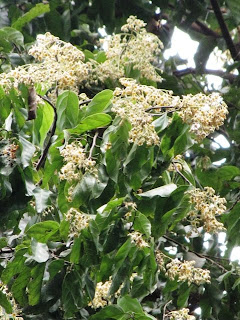I was blessed with an opportunity to see neighboring Indonesia on a shoestring budget. As usual I did not forego of the chance to learn what the Indonesian landscape would look like especially that it is very close to home yet one of its islands, Bali, is very well known for the lush tropical and at the same time very cultural-inspired gardens. But since it is still a foreign land, despite the proximity, the language barrier was the first to hurdle, towards learning more about Indonesian culture.
One thing we noticed about Bahasa language is the similarity of certain words to Filipino vocabulary. A little layman history, both our country and Indonesia have been included in the trade routes of prehistoric Chinese merchants. In some cases some words were slightly modified because the Chinese could not properly utter the sound of the letter 'R', frequently replacing it with 'L'. The following are a few words I encountered which underwent such phonetic transformation.
Scanning thru the resto menus we learned that wine in Indonesia is arak very closely resembling the Filipino word alak. In Indonesia there are a lot of wines ranging from sugar cane, palm juice and rice, hints of our very own tuba and basi. My friends Irene. Pinky and Cathy took taste samplings of the Indonesian wines (courtesy of Pradha Restaurant Bar). They ended up ordering glassfuls.
The Indonesian word for flavor is rasa, close to our own word lasa. The cup noodles and other food products would carry labels like rasa ayam or chicken flavor (ayam is chicken, goreng is fried, hence ayam goreng is fried chicken).
At the Ubud and Denpasar intersections I frequently encounter the phrase potong rambut so I asked our driver, Wayan, what it meant. he said it means cut hair (barber) with rambut being the translation for hair. It is why rambutan was named such because it is a hairy fruit. Rambutan is also called the same locally in the Philippines.
The Indonesian word for tiger is harimau. Tiger used to be abundant in Indonesia but now they are limited to a few individuals in the biggest island Sumatra. They were feared as monsters. Probably why it translated to halimaw in the Philippines, our vernacular for monsters.
More Indonesian 101 when I finally recall the other words I learned.
One thing we noticed about Bahasa language is the similarity of certain words to Filipino vocabulary. A little layman history, both our country and Indonesia have been included in the trade routes of prehistoric Chinese merchants. In some cases some words were slightly modified because the Chinese could not properly utter the sound of the letter 'R', frequently replacing it with 'L'. The following are a few words I encountered which underwent such phonetic transformation.
Scanning thru the resto menus we learned that wine in Indonesia is arak very closely resembling the Filipino word alak. In Indonesia there are a lot of wines ranging from sugar cane, palm juice and rice, hints of our very own tuba and basi. My friends Irene. Pinky and Cathy took taste samplings of the Indonesian wines (courtesy of Pradha Restaurant Bar). They ended up ordering glassfuls.
The Indonesian word for flavor is rasa, close to our own word lasa. The cup noodles and other food products would carry labels like rasa ayam or chicken flavor (ayam is chicken, goreng is fried, hence ayam goreng is fried chicken).
At the Ubud and Denpasar intersections I frequently encounter the phrase potong rambut so I asked our driver, Wayan, what it meant. he said it means cut hair (barber) with rambut being the translation for hair. It is why rambutan was named such because it is a hairy fruit. Rambutan is also called the same locally in the Philippines.
The Indonesian word for tiger is harimau. Tiger used to be abundant in Indonesia but now they are limited to a few individuals in the biggest island Sumatra. They were feared as monsters. Probably why it translated to halimaw in the Philippines, our vernacular for monsters.
More Indonesian 101 when I finally recall the other words I learned.
























